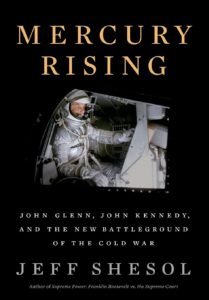Lecture Date: January 18, 2022
The JON Properties/Van Zandt Restorations Lecture

At the height of the Cold War, President John F. Kennedy saw space exploration as a race for survival—a race that America was losing. The Soviets seemed unstoppable in space. They had sent the first satellite into orbit, the first animal into orbit, and then, in 1961, the first man. The military implications were clear: The United States needed to catch up.
When John Glenn blasted off aboard Friendship 7 on February 20, 1962, he carried America’s hopes into orbit—and into a new and perilous Cold War battleground. He was perfectly suited to his mission. Though other astronauts called him “the Boy Scout,” they saw his ambition, his drive, and his fierceness of purpose. Glenn’s historic flight did not in itself win the space race, but it did shift the momentum by putting the United States on the path to the moon.
Drawing on his new book, Mercury Rising, author Jeff Shesol will examine how the astronaut’s heroics helped restore the nation’s sense of self-belief in what Kennedy called the “hour of maximum danger.”
Speaker: Jeff Shesol

Jeff Shesol is an author, historian, and an accidental speechwriter.
A founding partner of West Wing Writers, Jeff is the author of Supreme Power: Franklin Roosevelt vs. The Supreme Court, which was selected as a New York Times Notable Book of the Year in 2010 and a Favorite Book of the Year by The New Yorker. The Pulitzer Prize-winning historian Doris Kearns Goodwin described Supreme Power as “stunning,” the kind of book that comes “once in a generation,” and The New York Times Book Review called it “riveting ... revealing ... an impressive and engaging book ... deeply researched and beautifully written.”
Jeff’s previous book, Mutual Contempt: Lyndon Johnson, Robert Kennedy and the Feud that Defined a Decade, was also a New York Times Notable Book of the Year. Arthur M. Schlesinger, Jr. called Mutual Contempt “the most gripping political book of recent years.” In The New York Times, Michiko Kakutani described the book as “riveting ... Writing in sharp, fluent prose, Mr. Shesol does an authoritative job of giving us a vivid, almost novelistic sense of both of his protagonists, while at the same time situating their political stands within a historical context.”
In 1997, President Bill Clinton read Mutual Contempt and invited Jeff to become one of his speechwriters. During his three years at the White House, Jeff became the deputy chief speechwriter and a member of the senior staff. He played a leading role in drafting two State of the Union Addresses, the President’s 2000 Democratic National Convention speech, and the Farewell Address, among hundreds of other speeches. He covered a range of issues from economic policy to international development, technological innovation, and the arts. He also helped lead the President’s team of humor writers — a team that produced the acclaimed short film The Final Days.
A Rhodes Scholar, Jeff received his master’s in history from Oxford University in 1993 and graduated from Brown University with highest honors in 1991. He is a member of the Society of American Historians. His comic strip, Thatch, was nationally syndicated from 1994-1998, when it appeared daily in more than 150 newspapers. He has taught presidential history at Princeton University, where he was the Anschutz Distinguished Fellow in American Studies, and at the University of California Washington Center. Jeff publishes widely under his own byline and provides frequent commentary on TV and radio. He lives in Washington, DC, with his wife, Rebecca — a civil rights attorney — and their two children.